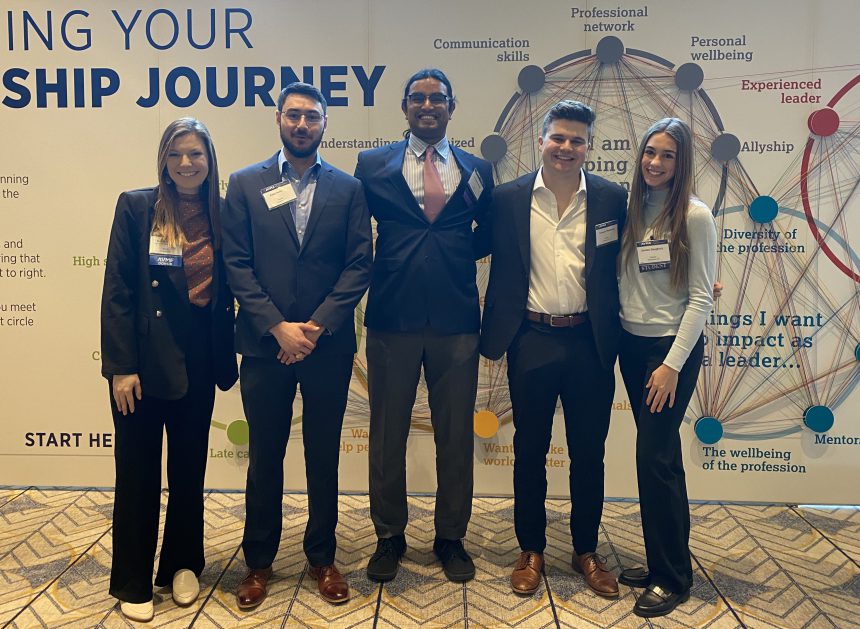By Satyajit Kulkarni
Satyajit Kulkarni, a first-year DVM/PhD dual-degree student, is pursuing a career where he can impact veterinary and human medicine through translational research—specifically at the intersection of immunology, synthetic biology, bioengineering, and One Health. Kulkarni, who is from India and grew up in Dubai, also is interested in entrepreneurship and clinical veterinary medicine.
This past January, Kulkarni participated in the 2023 American Veterinary Medical Association (AVMA) Veterinary Leadership Conference (VLC) at the Sheraton Grand Hotel in Downtown Chicago, IL. Here, he shares about his experience.

The AVMA VLC is a conference held every year where emerging, experienced, and established leaders in veterinary medicine come together and share their experiences as veterinary colleagues. It offers an excellent opportunity to network, learn about leadership and communication, and appreciate the breadth of the veterinary profession.
This year, I was chosen by the Student AVMA (SAVMA) to represent MSU at VLC 2023. Over three days, I attended numerous CE sessions on leadership and communication, district caucuses, and house of delegates meetings. I also had the chance to meet with the Michigan Veterinary Medical Association (MVMA) delegates, past-CEO, CEO, president, and president-elect, all of whom were very kind in teaching me the basics of how legislative veterinary medicine works. Additionally, I had the opportunity to meet some veterinary scientists and understand their perspective on why they pursued a dual degree, and how they have used their breadth of knowledge in practice.
Overall, I have three main takeaways from this conference:
Firstly, it was surprisingly difficult to choose a CE session when I wanted to attend more than one CE session at the same time. I had several favorite CE sessions in this conference. In particular, MentorVet’s session on the nature of burnout and imposter syndrome in veterinary medicine and how to manage it, led by Dr. Reinhard and Dr. Templeton, was insightful. They shared many tools, such as the idea of developing a “growth mindset,” which describes a thought process where failure is simply a stepping stone to growing and developing your skills. It represents a perspective shift toward recognizing failure, learning from it, and applying what you learned in your next attempt.

Secondly, it was fascinating to meet both recent graduates and established veterinarians and learn from their perspectives on the nature and challenges of the profession, leadership and management, and where the profession is headed. For example, I networked with some veterinarians who have spent the past 20-30 years as clinical practitioners. To me, they represent an untapped source of experience and mentorship for future veterinarians. At the same time, it also highlighted some traditional thought processes in older generations, and how newer generations of veterinarians are more poised toward facing emerging challenges like zoonotic diseases, integration of novel technologies (eg., artificial intelligence), and corporatization of the veterinary profession.
Lastly, I built friendships with veterinary students from other universities, and I was grateful to empathize with them on the challenges of being in vet school. In my experience as a veterinary student, I find time management is a critical challenge. Balancing our schoolwork with taking care of pets and family, staying physically fit, taking part in extracurriculars like clubs, and social activities is a difficult task. In this journey, connecting with my peers who are facing the same challenges helps me stay motivated and positive. Being an international student comes with its own set of unique challenges, and having people to connect with helps me feel like I have a home away from home.
Overall, I highly recommend the AVMA VLC for veterinary students. I learned a lot in the short time I spent with experienced and established leaders. To veterinary students reading this: the biggest opportunity at this conference is building your network, and so I urge you to sit next to someone you don’t know at every CE session and listen to their experience in veterinary medicine. I guarantee you won’t regret it.

